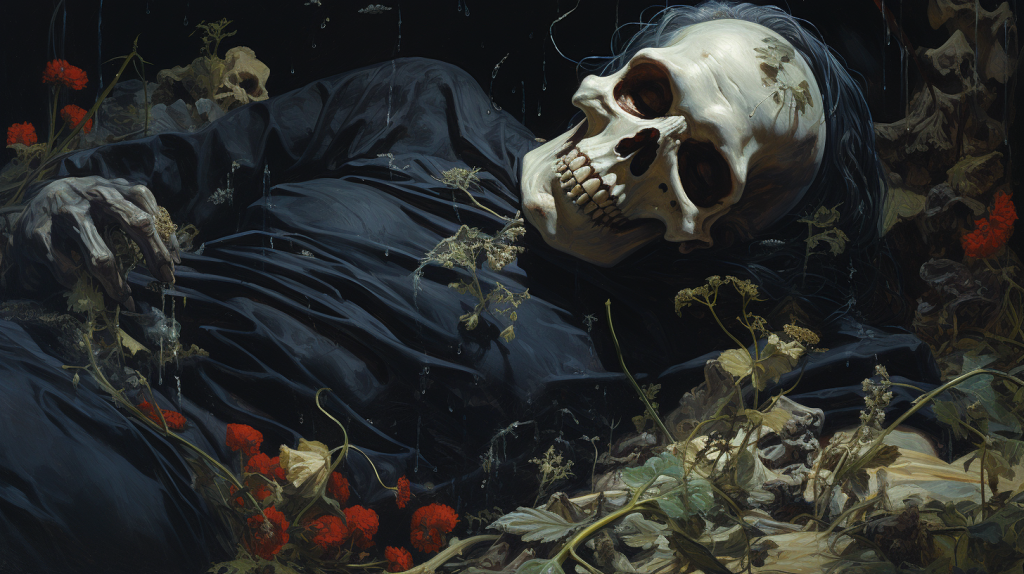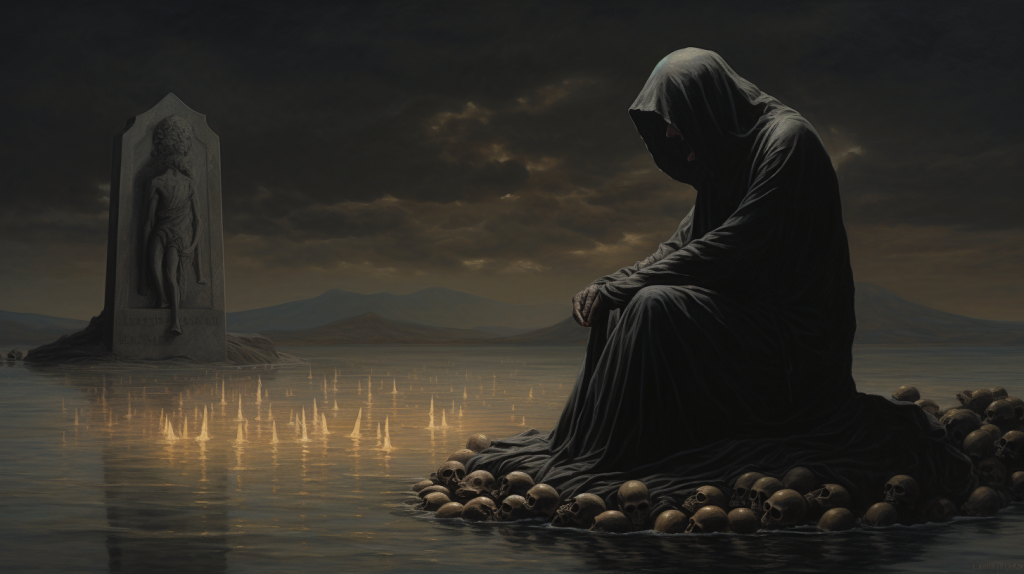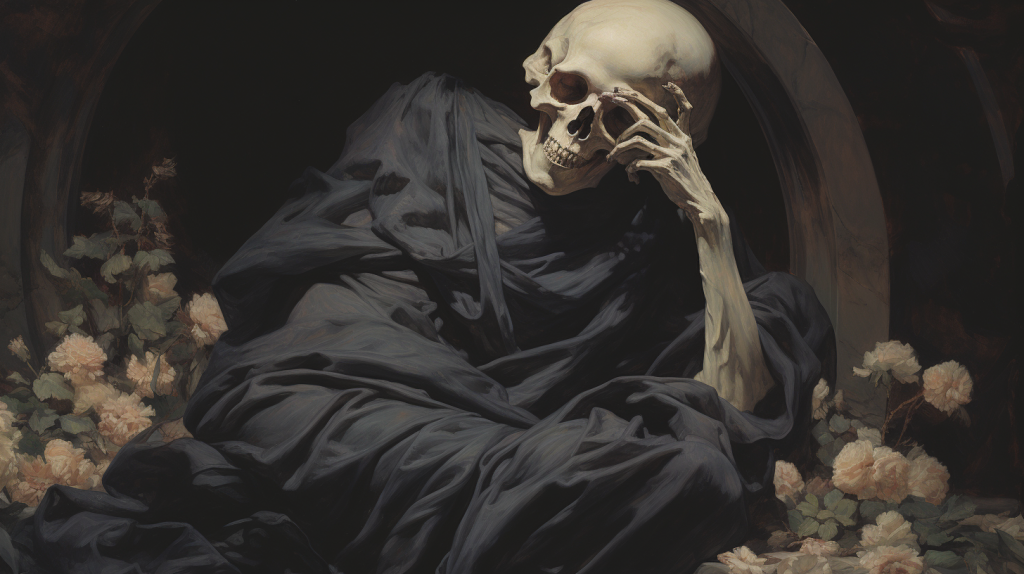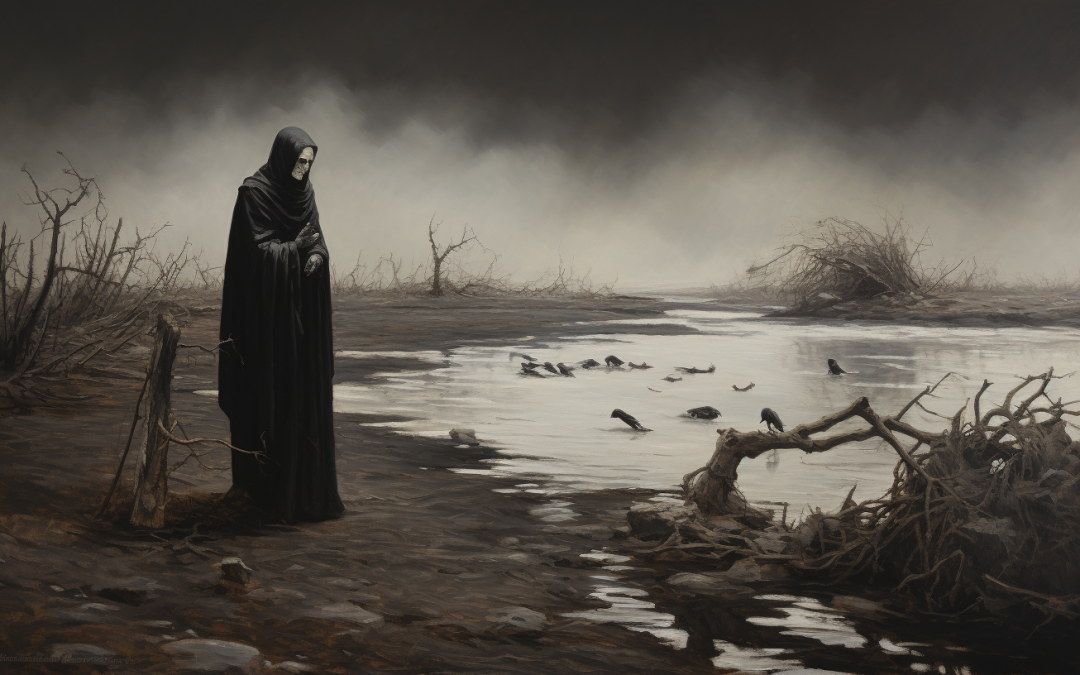Dreaming about Death usually signifies transformation and change, suggesting an end to one phase of your life and the beginning of another. It’s often less about literal death and more about significant life transitions.
Keywords : Transformation, Transition, Endings
Rating : 60% Positive / 40% Negative
Ever woken up with a jolt, heart pounding, after dreaming of death? It’s a topic that’s both unsettling and fascinating, tapping into the deepest parts of your psyche. While death in dreams can be disconcerting, it often holds significant symbolism that’s worth exploring.
In this article, you’ll dive into the various interpretations of death dreams, from endings and transformations to deep-seated fears and subconscious messages. Whether it’s your own demise or that of someone close, understanding these dreams can offer profound insights into your waking life.
Get ready to unravel the mysteries behind your nighttime narratives. Death dreams might just be the key to unlocking aspects of your life that are waiting to be discovered or addressed. Keep reading to decode what your subconscious is trying to tell you.
The Fascination with Death Dreams

Humanity has always held a deep fascination with the unknown, and the cryptic nature of death dreams is no exception. In your search for meaning, you’re tapping into a universal curiosity about the afterlife and the subconscious. Dreams of passing carry a mystique, a blend of fear and intrigue that is captivating to explore.
Cultural Interpretation plays a significant role in how you perceive and process these dreams. Different cultures view death in unique ways; for some, it’s merely a transition rather than an end, which can color the understanding of death-related dreams. Consider how the cultural lens through which you view death impacts the emotions and thoughts these dreams elicit in you.
Psychologists often regard dreams, especially those involving death, as reflections of your inner state. Death dreams could be your subconscious working through anxiety or stress, or processing significant changes in your life. Dream analysis suggests that who or what is dying in your dream could symbolize something that is coming to an end or undergoing transformation in your waking life.
For many individuals, the intrigue is in the personal symbolism of these dreams. They’re a puzzle to be decoded, with each element holding potential insight into your deepest thoughts and fears. You may find yourself revisiting these dreams, pondering their implications, and seeking out their messages long after you’ve awakened.
The allure of these nocturnal visions isn’t just about the dream itself—it’s about what it reveals about your own psyche. As you journey through the interpretations of death dreams, remember that there’s no one-size-fits-all explanation. Your experiences, beliefs, and emotions are all part of the unique tapestry that gives meaning to your dream narratives.
Exploring the Symbolism of Death Dreams

In the realm of dreams, death often embodies transformation and the ending of something old to make way for the new. When you encounter death in a dream, it’s essential to reflect on what aspects of your life are changing or need to change. The interpretation of death dreams may vary widely, but common threads tie into personal growth and shedding past behaviors.
- Endings and Beginnings: Viewing death as a symbol for an ending can be empowering when you’re embarking on a new life chapter.
- Internal Metamorphosis: Death may indicate a personal transformation, signaling profound self-discovery or shifts in your world view.
These dreams can also point to latent creativity or express a desire to escape from life’s pressures. Undoubtedly, they stir deep emotional responses, which can be both disconcerting and enlightening.
Psychological analyses often hinge on the context of the death dream. Ask yourself the following questions:
- Who or what is dying in the dream?
- How do you feel during and after the dream?
- Are there unresolved issues in your life that the dream may be reflecting?
Answers to these questions can reveal layers of symbolism that connect to your waking life, prompting valuable introspection. It’s also worth noting that the vividness of death dreams can invoke a sense of urgency, pushing you to pay attention to significant matters at hand.
Cultural norms and personal beliefs influence how you process such dreams. For instance, in some cultures, dreaming of death is considered a premonition or a sign of good fortune. On the other hand, death dreams can trigger anxiety levels influenced by societal views on mortality.
Interpreting dreams about death is a delicate process—a dance between your subconscious mind and the reality you perceive. Keep in mind, these dreams are typically less about actual death and more about your life’s symbolic vocabulary, a dictionary drafted by your experiences, fears, and aspirations.
By exploring the symbolism of death dreams, you’re peeling back the layers of your subconscious to better understand yourself and your journey through life.
Endings and Transformations: The Meaning Behind Death Dreams

When you experience a death dream, it’s common to wake up with a sense of alarm. However, these dreams often have a much deeper significance, beyond the initial shock. In many psychological traditions, death symbolizes the end of one phase and the beginning of another. Your death dream might not be a literal premonition, but a metaphor for transformation and change in your life.
Dreams involving death can represent:
- Closure of a significant life chapter
- Personal revolution and the desire for a fresh start
- Letting go of outdated beliefs or habits
- Shifts in personal identity or relationships
For example, envisioning the death of your previous self could signal that you’re undergoing a period of self-discovery. It’s not unusual to have such dreams during pivotal moments in life such as graduation, a career change, or the end of a relationship. Rather than focusing on an ominous interpretation, it’s helpful to see these dreams as a sign of personal evolution.
Dream experts often point out the link between death in dreams and real-life stress or anxiety. If you’re feeling overwhelmed by responsibilities or a difficult situation, your subconscious might use the imagery of death as a way to express your need for a significant change. It’s essentially a wake-up call from your mind, alerting you to take action or to reassess your current path.
Keep in mind that the context in which death appears in your dream is crucial. Are you a passive observer or actively involved? Is the death peaceful or violent? The nuances of your dream landscape can offer clues to the transitions occurring in your waking life. To decipher the message, consider keeping a dream journal. Noting down the details can help you spot patterns and gain clearer insights into your subconscious motivations and deepest desires.
Understanding the symbolism behind your death dreams can unlock a deeper awareness of your inner world. This awareness can guide you toward embracing upcoming changes with confidence rather than fear. Remember, your subconscious is a powerful tool that communicates through symbols, and death is one of its most profound messengers.
Confronting Deep-Seated Fears through Death Dreams
In the labyrinth of your mind, death dreams sometimes act as mirrors, reflecting deep-seated fears and anxieties. These can range from fear of failure or rejection to more existential dreads concerning your own mortality or the loss of loved ones. Recognizing the fear that resonates with your dream scenario can provide profound insights into your emotional state.
Consider the emotional context of your death dreams:
- A loss of control in your life might manifest as a sudden, unexpected death in a dream.
- Anxiety over life decisions may translate to the slow decline or illness of a dream figure.
- The death of a close dream character could express fears of change in your relationships.
Death dreams often push you to acknowledge emotions you might be inclined to suppress while awake. Embracing these dreams as opportunities to confront fears can be the first step in overcoming them.
Tracking your emotional responses to death dreams can highlight patterns. Through these patterns, you may uncover recurring apprehensions that extend beyond the sleep state. For example, if you consistently dream about the death of a career or project, it may indicate underlying fears about professional adequacy or success.
The symbols and details in your death dreams are unique to your experiences and psyche. Interpreting these elements effectively depends on considering them within the context of your current life.
- An encounter with death after a significant life event might symbolize the need to process the recent change.
- Frequent dreams of death amidst high stress or transition periods could signal an urge to find resolution or acceptance.
By understanding the themes and triggers of your death dreams, you’re better equipped to manage your fears and anxieties when they arise in waking life. Death dreams, with their direct tap into your subconscious, can serve as a catalyst for personal growth and emotional resilience. They challenge you to face what you fear most and, in doing so, may reveal a wellspring of inner strength that’s waiting to be acknowledged and harnessed.
Unraveling Subconscious Messages in Death Dreams
In your journey through the night, death dreams might shake you to the core, but they’re more than mere frights. They’re keys to unlocking the secrets of your subconscious mind. You’ll find that the characters and scenarios playing out in these dreams are not random—they’re reflections of your inner world.
Interpreting these symbols requires looking at your current life circumstances. A dream of a departed loved one could signify a need for closure or an unresolved issue between you and the person who’s passed. If you’re the one facing death in your dreams, it might indicate a personal transformation or the end of a significant phase in your life, suggesting it’s time for a change.
When dissecting these dreams, pay attention to the emotions they evoke. Are you scared, relieved, or perhaps indifferent? Your emotional response is a direct line to understanding what your subconscious is conveying. If fear is present, it might mean there are aspects of your life you’re afraid to face. Relief may point to a subconscious desire to let go of burdensome responsibilities or feelings.
To get a clearer picture:
- Jot down as many details as you can remember upon waking
- Note the context of the death—was it an accident, natural, or another form?
- Reflect on who is involved and the relationships you share with them
- Examine the setting for symbolic meaning—places from your past can represent old memories and feelings
Your dreams of death are a potent mixture of personal symbolism and emotional undercurrents. They can be particularly revealing during periods of stress or transition, where the psyche is more likely to express hidden fears or desires. By untangling these subconscious messages, you’re gaining insight into your deeper self, aiding in personal development and emotional understanding.
Decoding the Significance of Your Nighttime Narratives
Dreams about death can be disconcerting, but understanding their potential significance is a step towards self-discovery. When you plunge into the realm of sleep, your subconscious mind often communicates through vivid narratives that can reveal underlying thoughts and emotions.
Patterns and Frequency play a crucial role in interpreting your death dreams. A one-time occurrence might simply be a byproduct of a day’s stress or a random movie scene that impressed upon your mind. However, recurrent dreams, particularly those involving death, suggest a deeper exploration is needed.
Consider the following aspects as you dive into the symbolism of your dreams:
- Characters: Are you witnessing your own death, or that of someone close to you?
- Emotions: Do you feel fear, acceptance, or even relief during the dream?
- Context: Is the dream setting familiar or entirely fictitious?
By reflecting on these elements, you can begin to piece together what your subconscious might be attempting to communicate. Are you experiencing endings in your life, such as a relationship or job, where the death in your dream could symbolize a significant change or a desire for transformation?
Your nocturnal mind might also be wrestling with existential themes. Dreams of death can sometimes point to Anxiety About Aging or Illness, particularly if you or someone you know is going through a health crisis. Conversely, such dreams might represent a shedding of past insecurities, habits, or fears—an internal death paving the way for rebirth and new opportunities.
Remember, dreams leverage potent symbols, and death is among the most universally impactful. As you dissect these sleep stories, you’re peeling away layers of your psyche, uncovering truths that may have been obscured by the hustle of daily living.
It’s not just about what the dreams are but also about what they evoke in you and what changes they inspire. Monitoring your emotional and mental reaction to these dreams over time may yield patterns that offer Personal Insights and promote growth. Keep a dream journal, and don’t shy away from seeking additional perspectives, such as those from a dream analyst or therapist, especially if your dreams are causing distress or becoming increasingly vivid.
Conclusion
Dreams about death are often less about the end and more about the beginning of something new in your life. They’re a call to examine your feelings, relationships, and the transitions you’re facing. Remember that the subconscious mind communicates in symbols, so take the time to reflect on your death dreams to uncover deeper meanings. Keeping a dream journal can be a powerful tool for this exploration. And if the dreams persist or cause distress, don’t hesitate to reach out for professional insight. Your dreams are a unique part of your journey, guiding you towards personal growth and self-discovery.

